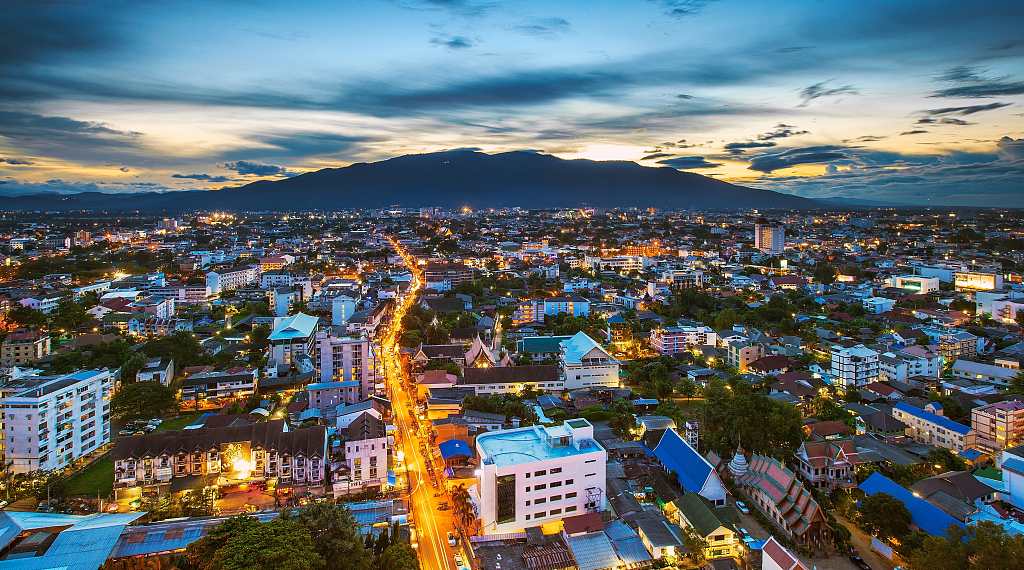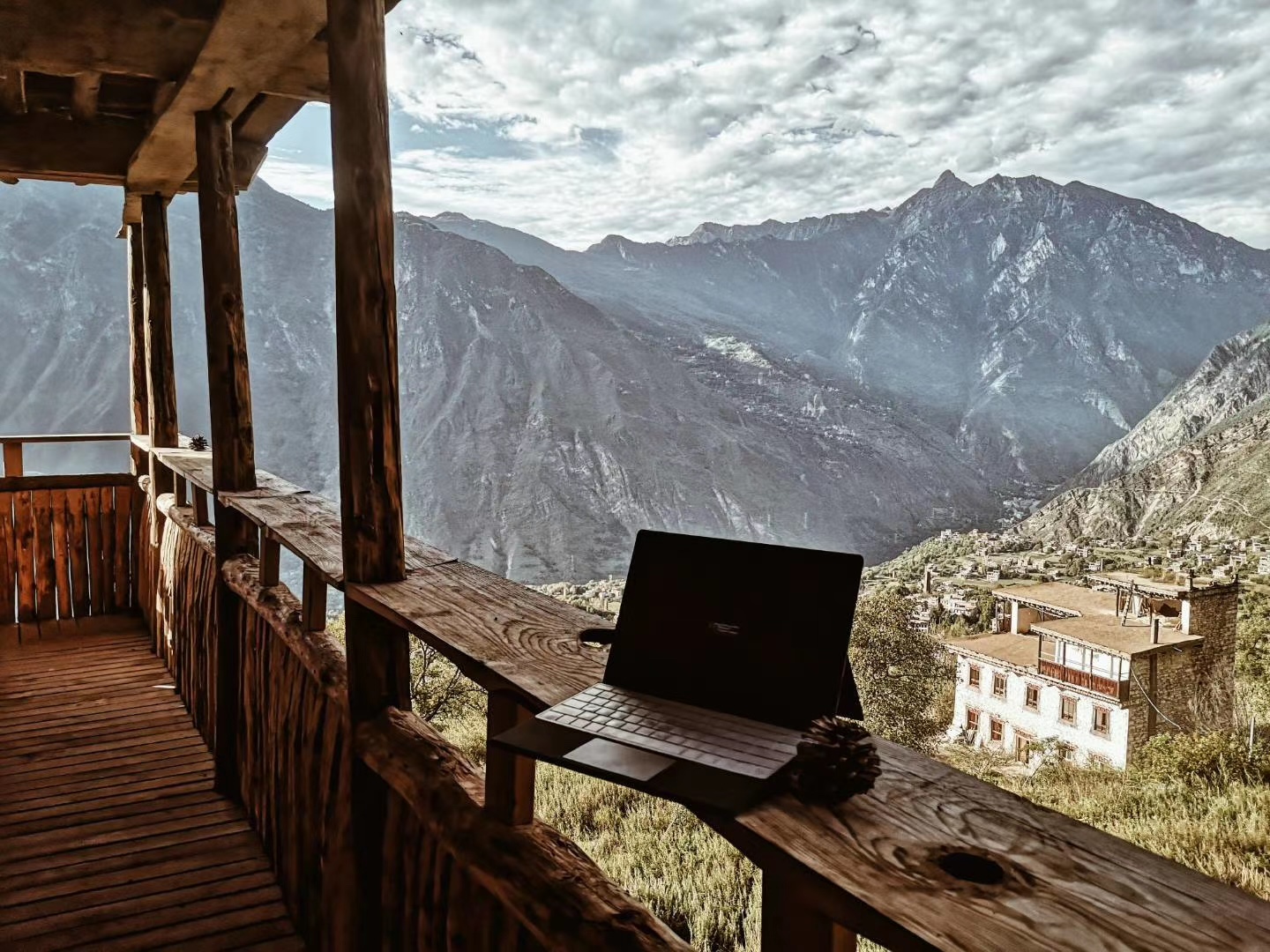
A view from beach hammock, poolside chair or coffee table, complete with a laptop. This has been the popular image of what it is like to be a "digital nomad" – the technology-equipped, globetrotting millennial freelancer. For many ordinary office workers in 2021, working remotely at picturesque locations is no longer a distant dream.
"I would rent a villa in Chiang Mai, Thailand and live there for a month," said Gui Chuanjun, who learned about the digital-nomad way of life through overseas bloggers a few years ago. Now working from home about half the time, the 32-year-old tech worker in east China's Suzhou City is talking about working remotely in Thailand's hotspot city, where his white-collar income would go a long way, as a real plan.
In April, Gui created the first online community for digital nomads in China. As the website's users grew by hundreds in the last two months, Gui met many like-minded young people like himself – tech industry employees working from home, but itching to venture far.
Interest in joining the free-roaming tribe of professionals is increasing. Apart from a welcome change of scene, a flexible schedule appeals to many internet workers clocking in long hours at the office, Gui told CGTN.
His vision for this lifestyle change is clearly spelled out in the website's slogan: "Remote working, travel the world."

Chiang Mai, Thailand is a popular destination for digital nomads. /VCG
Chiang Mai, Thailand is a popular destination for digital nomads. /VCG
The location-independent lifestyle is having a big moment. As offices around the world go online during COVID-19, working from home – an otherwise radical idea for many in pre-pandemic times – has become the new normal.
With Big Tech leading the way, a growing list of major companies are making remote work long-term. A recent survey by U.S.-based tech firm Simform found a majority of companies have plans to allow employees to work from home indefinitely (82 percent) or permanently (77 percent).
Meanwhile, the number of people identifying as "digital nomads" in the U.S. rose to 10.9 million in 2020, a 50 percent jump from the 7.6 million in 2019, according a new report by the U.S.-based consulting firm MBO Partners.
Broader support of remote work is inspiring new ways to work, travel and live. The "workation," which combines remote work with longer-period vacation rentals, is one of the fastest-growing travel trends aimed at attracting remote workers to help boost the local economy.
After a bleak year, the travel industry and tourism-dependent countries are keen to embrace digital nomads, who for a long time have been a taxation headache for governments. From Europe to the Caribbean, at least a dozen countries launched remote working visas during the pandemic, in anticipation for the arrivals of globetrotting teleworkers once international travel resumes.

The island country of Barbados is welcoming digital nomads with a new remote working visa. /CFP
The island country of Barbados is welcoming digital nomads with a new remote working visa. /CFP
The term "digital nomad" often brings to mind college-educated tech-savvy young people from wealthy countries, who are able to leverage the most "geo-arbitrage," a jargon describing the perks Westerners enjoy in less developed countries.
Amplified by the 2010 New York Times bestseller "The 4-hour Work Week: Escape The 9-5, Live Anywhere and Join the New Rich" by Timothy Ferris, the digital-nomad movement took off among millennial white-collar workers in the West in the last decade.
Now that the momentum has spread worldwide, insiders believe the make-up of the group is unlikely to change much after the pandemic.
"At the moment, being a digital nomad is a very Western phenomenon of people who can travel the world; becoming one is a symbol of a 'privileged lifestyle'," said Olga Hannonen, a postdoctoral researcher at the University of Finland who studies digital nomads. "It's easier for some people to become digital nomads, and harder for others, domestically or internationally, pre- or post-COVID-19."
Gui, the tech worker, also thinks that the community in China will stay small. "The only ones with the ability to travel around are the freelancers. The rest of us can only work remotely if the company allows it," he said.

Jacob Tan takes a photo of his computer with the backdrop of mountains in Garze Tibetan Autonomous Prefecture, southwest China's Sichuan Province, August 27, 2020. /Courtesy of Jacob Tan
Jacob Tan takes a photo of his computer with the backdrop of mountains in Garze Tibetan Autonomous Prefecture, southwest China's Sichuan Province, August 27, 2020. /Courtesy of Jacob Tan
Jacob Tan, an entrepreneur from east China's Hangzhou City, is living the true digital-nomad life. Since starting his own sustainability consulting company in 2015, the 31-year-old has traveled to hundreds of cities and towns around China on the job.
Before he heard the concept of "digital nomads" for the first time during a trip to Bali, Indonesia, Tan would say he's the "anywhere worker." Since 2019, he has been working at a different location almost every week.
But for the frequent traveler, his nomadic lifestyle is more about work than travel. "It just happened that my work requires a lot of traveling to rural areas, and I love running around and being close to nature," Tan said, describing himself as a "rural digital nomad."
"There is no template for how to be a digital nomad," Tan told CGTN. "For some it is work, for others a more relaxed life. Luckily for me, I enjoy my work."
Tan said although he supports this kind of remote work for his team, it suits few in reality. "Going remote allows the most self-disciplined people to produce the best work regardless of their location," Tan said. But before many people could manage their time and space, they often fail at managing themselves, he said.

Jacob Tan works with his team in a village. /Courtesy of Jacob Tan
Jacob Tan works with his team in a village. /Courtesy of Jacob Tan
At the very least, aspiring nomads like Gui have started exploring new possibilities of how one wants to start their day: tedious commute to the office, or sea breeze and the smell of nature?
And they say knowing what you want is the first step in getting it.
(Cover photo by CFP)

